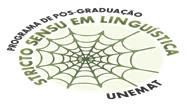Banca de DEFESA: RAYANI ANDRESSA DA CRUZ OLIVEIRA
Uma banca de DEFESA de DOUTORADO foi cadastrada pelo programa.DISCENTE : RAYANI ANDRESSA DA CRUZ OLIVEIRA
DATA : 18/05/2023
HORA: 14:00
LOCAL: Cidade Universitária
TÍTULO:
THE LINGUISTIC ATTITUDES OF THE FOLLOWERS ON THE SOCIAL NETWORK INSTAGRAM WITH THE LEXICAL VARIATION IN THE BRAZILIAN NORTHEAST VIRTUAL DICTIONARIES
PALAVRAS-CHAVES:
Sociolinguistics and dialectal studies; Lexical variation; Digital dictionary; Attitudes; Instagram
PÁGINAS: 179
GRANDE ÁREA: Lingüística, Letras e Artes
ÁREA: Lingüística
SUBÁREA: Sociolingüística e Dialetologia
RESUMO:
This thesis is part of the research line “Study of Variation and Change Processes” of the Stricto Sensu Graduate Program in Linguistics at the State University of Mato Grosso (UNEMAT) and aims to demonstrate the lexical variation that occurs in certain categories of the themes found in publications on the digital social network Instagram. Thus, we sought through Sociolinguistics and its aspects such as ethnography and social psychology to understand the attitudes of followers of the so-called, Alagoanês dictionaries; the Paraiban dictionary; the Sergipanese dictionary; the Bahian dictionary with published lexical variants. Therefore, the studies by Lambert (1966) and Moralez (1993) are of great relevance to this study. Accordingly, dialectological studies and regional vocabulary such as; Doiron (2017) with the Linguistic Atlas of Alagoas (ALEAL); Santana (2017) with Bahian dialectal vocabulary Vol. I and II; Souza (2007) Portuguese obscene vocabulary; Aragão (1999) the wave of Northeastern dictionaries; the etymological dictionary of the Portuguese language (CUNHA, 2010) and the UNESP dictionary of contemporary Portuguese (BORBA, 2011), all of these studies will help us to verify the veracity and extension of the selected lexical variants. In this way, we also aim to demonstrate that these profiles called dictionaries were produced and published on the digital social network Instagram, by non-specialized people. However, as this is a relatively new research field for the area of language, it was necessary to seek a specific methodology, so for this study, we used the methods of observation and data collection from virtual Ethnography. Thus, in the results of this research, a total of 25 lexis of lexical order were verified, of which some are repeated among the profiles of the digital dictionaries. Based on these results, the data were organized and analyzed into four categories, namely: 1) Parts of the human body: penis/whip; vagina/tobacco; clitoris/nub; thin legs/tenders; eyelids/chapel; back/ hunchback; stomach/belly; nose/snout, neck/scruff; heel/mocotó. 2) Feelings/emotions: laughing/joking; distrustful / goatherd; sure of/ certainty; nice/candy/cool; surprised/ really; 3) Clothing: slippers/drilleys alpargata/; slipper/japanese slipper; hair tiara/crown; coat/cloak; bra/bodice; staple/clip. It was also verified from the comments left in the analyzed publications, more precisely (26) productive comments to the linguistic attitudes of the followers of the researched profiles towards the lexical variation.So these analyzes took place from two indices; cognitive attitude index and affective attitude index. And so, we found mostly positive attitudes of the members towards the published lexical variants.
MEMBROS DA BANCA:
Presidente - 80737005 - JOCINEIDE MACEDO KARIM
Interno - 132146001 - BARBARA CRISTINA GALLARDO
Interno - 37199002 - TAISIR MAHMUDO KARIM
Externo à Instituição - FERNANDO JESUS DA SILVA - UFMT
Externo à Instituição - MARÍLIA SILVA VIEIRA - UEG



